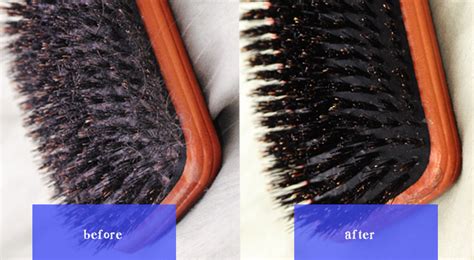From Grimy to Gleaming: Boar Hair Brush Cleaning Hacks
Boar bristle brushes are a staple in many hair care routines, prized for their ability to distribute natural oils, stimulate the scalp, and add shine. But these hardworking tools require regular cleaning to maintain their effectiveness and hygiene. A dirty brush can harbor oil, product buildup, dust, and even dead skin cells, hindering its performance and potentially irritating your scalp. This guide will delve into effective boar bristle brush cleaning techniques, transforming your grimy brush back into a gleaming tool for healthy hair.
Why Clean Your Boar Hair Brush Regularly?
Before we dive into the cleaning methods, let's understand why regular cleaning is crucial. A buildup of dirt and product residue on your boar bristle brush can lead to several issues:
- Reduced Effectiveness: Clogged bristles can't effectively distribute sebum (natural oils) through your hair, leading to dryness or dullness.
- Scalp Irritation: Accumulated dirt and oil can clog pores on your scalp, leading to irritation, itching, and potentially even breakouts.
- Bacterial Growth: A dirty brush provides a breeding ground for bacteria and fungi, potentially causing scalp infections.
- Damaged Hair: The buildup can weigh down your hair, making it look limp and lifeless. It can also snag and pull on your hair, potentially leading to breakage.
How Often Should You Clean Your Boar Hair Brush?
The frequency of cleaning depends on your hair type and how often you use the brush. Generally, you should aim to clean your boar bristle brush:
- Weekly: For individuals with oily hair or those who use a lot of hair products.
- Bi-weekly: For those with normal to dry hair and who use minimal hair products.
- Monthly: At minimum, even for those with dry hair, to remove dust and debris.
Different Methods for Cleaning Your Boar Hair Brush: A Comprehensive Guide
Here are several effective methods for cleaning your boar bristle brush, catering to different levels of dirt and your personal preference:
Quick Cleaning (Daily or After Each Use):
This method is ideal for maintaining your brush between deep cleans. Simply use a wide-tooth comb to remove loose hair and debris from the bristles. You can then gently wipe the bristles with a clean, damp cloth.
Deep Cleaning (Weekly or Bi-weekly):
This method is necessary to remove ingrained dirt and product buildup. Here's a step-by-step guide:
- Remove Loose Hair: Use a wide-tooth comb or your fingers to remove as much loose hair as possible from the bristles.
- Wash with Mild Shampoo: Fill a bowl with lukewarm water and add a small amount of mild shampoo (avoid harsh chemicals). Gently swirl the brush in the soapy water, ensuring the bristles are thoroughly saturated. Avoid submerging the brush handle completely, especially if it's made of wood.
- Rinse Thoroughly: Rinse the brush under lukewarm running water until all the shampoo is removed. Make sure to rinse from the base of the bristles towards the tips to ensure you remove all the soap residue.
- Air Dry: Lay the brush flat on a clean towel, bristles facing downwards, and allow it to air dry completely. Avoid placing it in direct sunlight or using heat to dry it, as this can damage the bristles.
Baking Soda Paste Method (For Stubborn Buildup):
For stubborn product buildup, a baking soda paste can be highly effective:
- Prepare the Paste: Mix a small amount of baking soda with a little water to create a paste.
- Apply the Paste: Gently apply the paste to the bristles, working it into the brush with your fingers.
- Rinse and Dry: Rinse the brush thoroughly and air dry as described above.
Addressing Common Concerns:
Can I use hot water to clean my boar bristle brush?
No, avoid using hot water, as it can damage the bristles and potentially warp the brush handle. Lukewarm water is ideal.
How do I clean a wooden-handled boar bristle brush?
For wooden-handled brushes, avoid submerging the handle completely in water. Focus on cleaning the bristles and gently wiping the handle with a damp cloth.
My boar bristle brush still smells after cleaning. What should I do?
If your brush still smells after cleaning, try soaking it in a solution of equal parts water and white vinegar for about 30 minutes before rinsing and drying. The vinegar will help neutralize odors.
By following these cleaning hacks, you can keep your boar bristle brush clean, hygienic, and functioning at its best, ensuring your hair stays healthy and shiny for years to come. Remember consistent cleaning is key to maximizing the lifespan and effectiveness of your brush.

